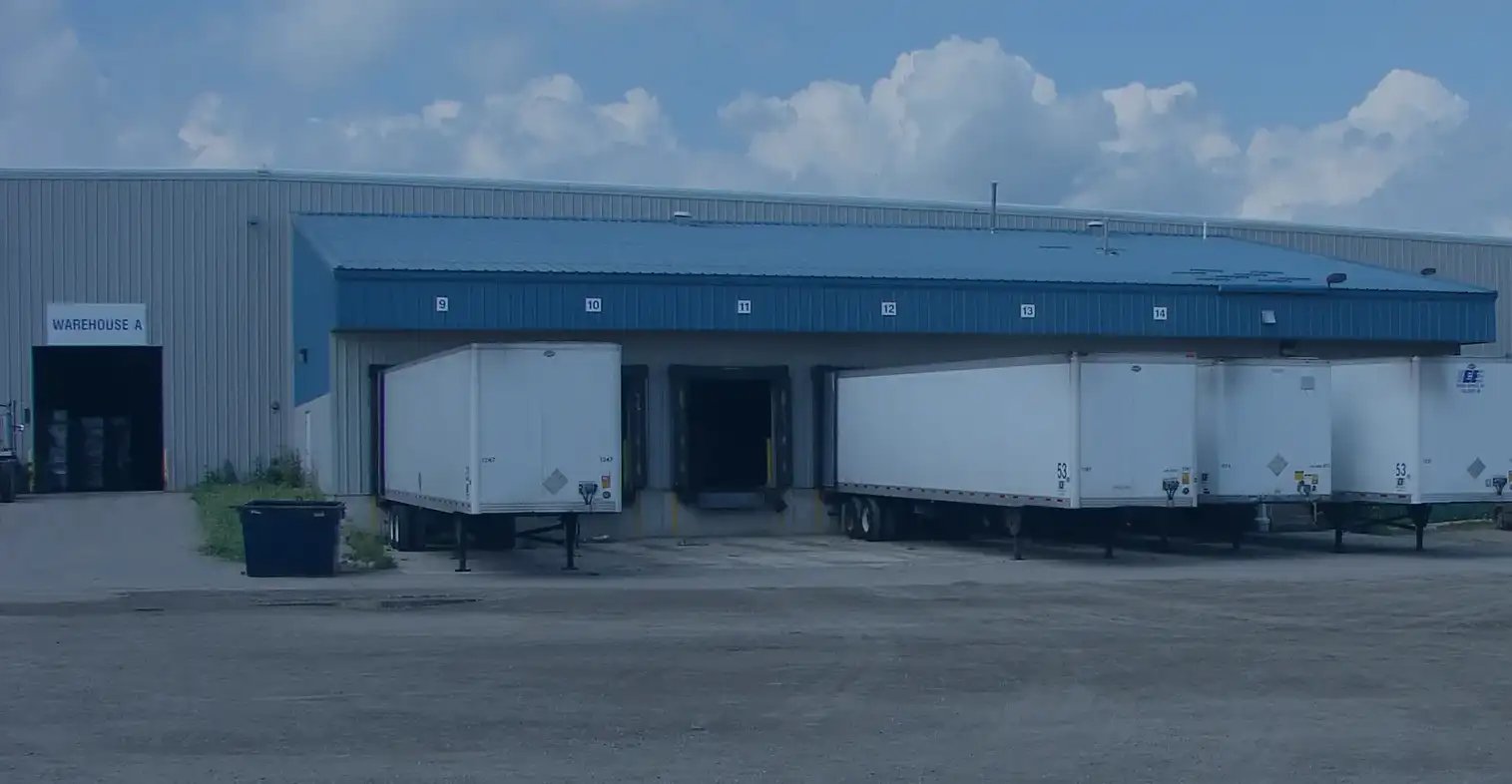Key takeaways
- Certifications and compliance are the foundation of food safety. Make sure your warehouse has FDA Food Facility Registration and any necessary state-level licenses. Additional certifications (e.g., SQF) may be needed depending on your product and customer requirements.
- Pest control and inventory management are critical. A robust pest control program and effective lot tracking (including First-In, First-Out practices) are non-negotiable for preventing contamination and enabling quick, targeted recalls if needed.
- Specialized handling and facility standards protect product untegrity. Proper temperature monitoring, cross-contamination prevention, and high cleanliness standards (drainage, lighting, security) are essential for food-grade storage.
- Value-added services improve supply chain efficiency. Warehouses that offer pre-loading, shipment consolidation, and transportation integration can reduce turnaround times, optimize costs, and enhance operational flexibility.
- The right warehousing partner is an extension of your business. A strategic location, scalability, and seamless integration with logistics services help food manufacturers respond quickly to market demands and avoid costly disruptions.
Badger Warehouse offers 210,000 square feet of FDA-registered storage space in Fall River, Wisconsin, with 27 docks enabling rapid turnaround times and strategic positioning for efficient Midwest distribution. Learn more about our food-grade warehousing services and get a quote to experience truly reliable warehousing management.
A brief introduction
In the 15+ years I've spent in the logistics industry, I've seen firsthand how food manufacturers face unique challenges when it comes to warehousing. It's not just about finding space to store your products—it's about ensuring product integrity, maintaining proper certifications, and having systems in place to track everything from lot numbers to temperature conditions.
When you're shipping food products, the stakes are higher. Your warehousing partner isn't just storing boxes; they're safeguarding your brand reputation and, ultimately, consumer safety.
Let me walk you through what you should expect from a quality food-grade warehouse and how these requirements translate to real-world benefits for your business
|
Looking for food-grade warehousing and integrated logistics in Wisconsin? Let's talk.
Shippers struggling with just-in-time inventory and complex logistics partner with Badger Warehouse, strategically located in Fall River, Wisconsin. Our flexible, food-grade storage and lightning-fast 30-minute turnarounds help you meet tight deadlines and maintain product integrity, avoiding costly delays and inventory mismanagement. Learn more about our warehouse and get in touch to start the conversation. |
The basics of warehouse food safety
Any warehouse claiming to handle food products should have, at minimum, these essential certifications:
- FDA Food Facility Registration: This isn't optional—it's a federal requirement for any facility that manufactures, processes, packs, or holds food for human or animal consumption in the United States.
- State Food and Public Warehouse Licensing: In Wisconsin, for example, warehouses need specific state-level certifications to legally store food products.
What many food manufacturers don't initially realize is that these basic certifications are just the starting point. Depending on your specific products and customer requirements, you might need a warehouse with additional certifications.
While some larger facilities invest in certifications like SQF (Safe Quality Food) that can cost $3,000-$10,000, smaller food-grade warehouses like ours at Badger Warehouse focus on maintaining the core FDA and state requirements that most manufacturers need.
If you're dealing with a warehouse provider, don't hesitate to ask for their current certifications. Any reputable food-grade warehouse will readily provide documentation showing they're properly registered and licensed.
Pest control: non-negotiable in food-grade facilities
When I'm talking with potential food manufacturing clients, I always emphasize that pest control isn't just another line item—it's absolutely critical. A single pest incident can compromise entire shipments and trigger recalls that damage both finances and reputation.
What makes for an effective pest control program in a food-grade warehouse?
- Regular, documented inspections by licensed pest control professionals
- Comprehensive perimeter protection
- Detailed monitoring systems with quick-response protocols
- Prevention practices integrated into daily operations
At our Badger Warehouse facility, pest control is our number one priority for food-grade storage. We implement multiple protective measures and maintain detailed documentation of our program. This isn't just about checking boxes; it's about creating an environment where your food products remain safe and uncontaminated throughout storage.
Inventory management and lot tracking
One thing I've learned working with food manufacturers over the years is that inventory management for food products carries additional complexities compared to general merchandise. Here's what you should look for:
First In, First Out (FIFO)FIFO isn't just an accounting method—it's a critical inventory management practice for food products. A good food-grade warehouse should have systems in place to ensure older product ships first, minimizing the risk of product expiration while in storage. |
Lot number trackingEffective lot tracking capabilities are essential for two key reasons:
|
While some warehouses employ complex barcode scanning systems for lot tracking, we've found that many of our Wisconsin food manufacturing clients actually prefer our more straightforward, customizable spreadsheet-based system. It's simple, but surprisingly effective—and importantly, it's something our customers can easily understand and work with.
Specialized handling requirements
Food products often require specific handling procedures that general warehouses aren't equipped to manage. Consider these specialized needs:
Temperature monitoringWhile we don't offer refrigerated storage at our facility (we store manufacturer-packaged food products that don't require refrigeration), temperature monitoring remains important even for ambient storage. Extreme temperature fluctuations can affect product quality and shelf life, so a good food-grade warehouse should monitor environmental conditions. |
Cross-contamination preventionFor warehouses handling multiple food products, separation protocols are essential. This includes:
|
At Badger Warehouse, we maintain segregated warehouse areas that allow us to keep different types of food products separate, preventing any risk of cross-contamination. This is particularly important for clients who need to ensure allergen control.
The physical facility: what to look for
The physical characteristics of a warehouse significantly impact how well it can serve food manufacturers.
Here are key features to consider:
Loading and unloading capabilitiesEfficient loading and unloading reduces the time products spend in transition (and potentially exposed to uncontrolled conditions). Our facility features 27 dock doors, allowing for rapid processing of inbound and outbound shipments. Most drivers are in and out within 30 minutes—a metric we're particularly proud of. |
Clean, well-maintained storage areasFood-grade warehouses must maintain higher cleanliness standards than general warehouses. This includes:
|
Strong security measuresProduct security is particularly important for food items. A quality food-grade warehouse should have:
|
Beyond storage: value-added services for food manufacturers
A truly valuable warehousing partner offers more than just space—they provide services that streamline your overall supply chain.
Look for these capabilities:
Pre-loading and shipping coordinationThe ability to pre-load trailers for efficient pickup can significantly reduce turnaround times. This is especially valuable for manufacturers with just-in-time delivery requirements or those dealing with seasonal demand fluctuations. One of our clients, a Wisconsin-based food packaging company, particularly values our ability to pre-load their trailers. They can load at night or whenever production completes, which helps keep their inventory levels down and their docks clear! |
Consolidation servicesFor manufacturers shipping to multiple destinations, consolidation services can optimize shipping costs. This involves combining smaller shipments into full truckloads, reducing per-unit shipping costs. |
Transportation integrationA warehouse with integrated transportation services offers significant advantages:
At Badger Logistics, our warehousing services are fully integrated with our transportation operations. This means we can offer customers a seamless solution that handles both storage and movement of their products, often pre-loading trailers so drivers can hook and go without waiting. |
Making the right choice for your food products
When selecting a food-grade warehouse, consider these factors:
- Appropriate Certifications: Ensure the facility meets all regulatory requirements for your specific products.
- Inventory Management Capabilities: The system should match your needs—sometimes simpler is better as long as it's accurate.
- Location and Accessibility: A strategic location reduces transportation costs and delivery times. Our location in Fall River, Wisconsin provides excellent access to major transportation arteries while being just under 30 minutes from Madison, just over an hour from Milwaukee, and about 2.5 hours from Chicago.
- Scalability: Can the warehouse accommodate fluctuations in your inventory levels? Seasonal businesses particularly need this flexibility.
- Integration Options: Consider how the warehouse fits into your broader supply chain strategy.
Final thoughts and next steps
In my years working with food manufacturers across Wisconsin and beyond, I've found that the most successful warehousing relationships aren't transactional—they're partnerships. The right food-grade warehousing partner doesn't just store your product; they become an extension of your operations, contributing to your overall efficiency and success.
At Badger Warehouse, we pride ourselves on understanding the unique needs of food manufacturers in our region. Our 210,000 square foot FDA-registered food-grade facility, combined with our integrated transportation services, provides the infrastructure food manufacturers need. But what truly sets us apart is our flexibility and commitment to service—most drivers are in and out within 30 minutes, and we accommodate last-minute needs every day.
We believe in proving our flexibility through action rather than just talking about it. That's why our relationships with food manufacturing clients tend to span years, even decades. When you find a warehousing partner who truly understands your business and consistently delivers on their promises, it becomes one less thing you have to worry about in your complex supply chain.
Maximize supply chain efficiency with flexible, fast warehousing at Badger Warehouse
Shippers struggling with just-in-time inventory and complex logistics partner with Badger Warehouse. Our flexible, food-grade storage solutions and lightning-fast 30-minute turnarounds help you meet tight deadlines and maintain product integrity, avoiding costly delays and inventory mismanagement.

We combine decades of experience with a commitment to simplicity and flexibility. Our team utilizes a straightforward, customizable inventory management system that our clients love. We're not just a storage facility — we're your strategic partner in streamlining your supply chain, offering pre-loading services, indoor flatbed handling, and seamless integration with our transportation services.
Learn more about Badger Warehouse and get in touch with us to start the conversation.




